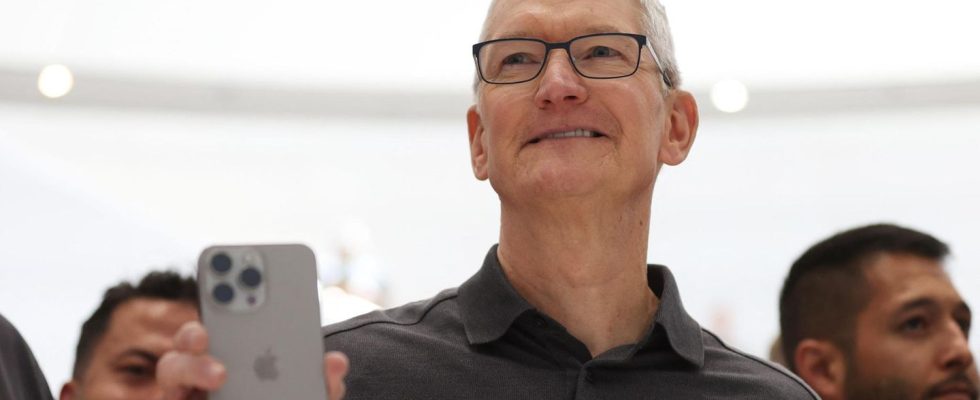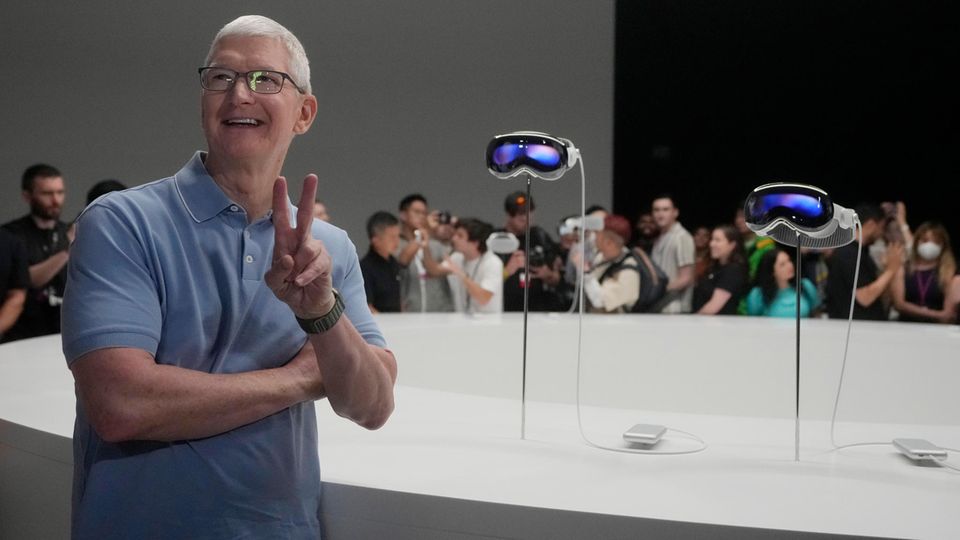Technology
34 billion US dollars profit: The iPhone remains Apple’s driving force – but the future is approaching
Apple CEO Tim Cook is starting a new era for the company with the Vision Pro – the iPhone meanwhile keeps Apple’s financial backing free
© Justin Sullivan / AFP
On Friday, Apple will enter a new market for the first time since 2015 with its Vision Pro computer glasses. Shortly before that, there are fresh figures from the iPhone company: It was a lucrative Christmas.
With the device, which is sold starting at $3,499 (around 3,200 euros) before taxes, Apple wants to establish a “spatial computer” with which users can display digital content within their real surroundings.
The Vision Pro records the environment with cameras and displays it together with the additional content on displays in front of the eyes. Apple advertises the possibility of using the glasses to distribute virtual displays for working in the room, to watch films as if on a large screen or to refresh memories using 3D videos recorded with the iPhone.
Apple has a “historic day” ahead of it
Apple boss Tim Cook called the glasses a “revolutionary device” and declared Friday a historic day. The Vision Pro will compete on the market primarily against the Quest glasses from the Facebook group Meta. Meta originally specialized in virtual reality (VR), in which users completely immerse themselves in digital worlds. But the current Quest 3 model in particular can also display the real environment. The Quest 3 is sold by Meta for $500. The group is investing billions in the business, but it has remained a niche market so far.
At Apple, the iPhone was once again the driving force of business in the Christmas quarter, with sales increasing by around six percent to $69.7 billion, as the company announced after the US stock market closed on Thursday. According to calculations by market researchers, Apple became the world’s largest smartphone provider for the first time last year, replacing long-standing leader Samsung. In Western Europe, among other places, iPhone sales reached a record high in the last quarter, as CFO Luca Maestri said.
Shares fell due to mediocre forecast
However, Apple was very cautious in its forecast for the current quarter. CFO Maestri pointed out that pent-up demand due to a production break for the iPhone 14 Pro resulted in additional revenue of five billion dollars in the comparable quarter. If you take this out, sales will remain roughly the same. According to this forecast, Apple shares slipped deeper into the red and ended after-hours trading with a discount of almost three percent.
Sales in the last quarter rose by two percent year-on-year to 119.6 billion dollars (110 billion euros). It was the first increase in sales after four quarters of declines. Apple also digested a decline in revenues of around 13 percent in the China segment, into which the group includes business in Taiwan and Hong Kong. The bottom line is that Apple increased profits by 13 percent to $33.9 billion.
While iPhone sales exceeded analyst forecasts, Apple missed market expectations in its services business, Mac computers and the iPad.
After a question about the changes to Apple’s App Store in the EU when the DMA digital law came into force, the company tried for the first time to classify the role of the market. Apple generates around seven percent of its App Store revenue in the EU, said Maestri.
According to the DMA, Apple must, among other things, offer app developers the opportunity to offer their applications outside of the company’s own download platform. In this case, Apple wants to charge apps with more than a million downloads a fee of 50 euro cents for each additional initial installation once a year. Developers can also choose to distribute their apps only through Apple, as before. Critics like Spotify accuse Apple of wanting to cement the current situation. Cook said Apple has always been concerned about privacy and security and wanted to preserve that as much as possible when implementing the new rules.
Meta boss Mark Zuckerberg said on Thursday that the new possibilities will not play a role in Apple’s current implementation. In his view, this runs counter to the EU’s intentions for regulation. “I would be surprised if any developer went to alternative app stores,” Zuckerberg said.




